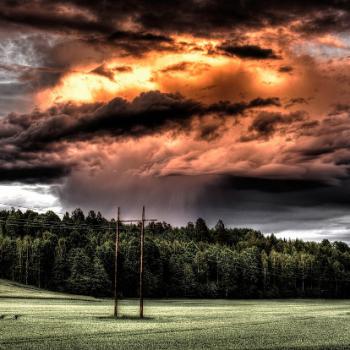
The issue of cultural appropriation is one that has come up a number of times in the pagan, polytheist, and occult communities. At times the discussion is helpful, at others there is clear confusion between what is appropriation vs appreciation, and occasionally there are those who appropriate the notion of appropriation.
What do I mean by all of this? Let’s first begin with some definitions.
Cultural appropriation is typically defined as “the act of taking or using things from a culture that is not your own, especially without showing that you understand or respect this culture.” But what is most important about the concept that is typically not always understood or explicitly stated is that it is referring specifically to cultures that were colonized, disenfranchised, and ultimately not ones that are in the position of power within the culture of the appropriator. Everything comes down to disrespecting marginalized cultures by taking aspects of their culture out of context in a manner that not only isn’t originally intended, but in a way that diminishes their meaning.
I find it best to explain through examples:
Cultural appreciation: a non-Native learning directly from a Native how to do smudging, and using it in your own personal practice as a means of cleansing or purifying a space. You have the blessing of a Native person, you learned how to do it correctly, and you’re not using it in any other way other than intended. In addition, you’re treating the practice appropriately and with respect.
Cultural appropriation: a non-Native wearing a Native American headdress to Burning Man as a “cool costume”. These items were earned and worn with respect to ceremonies, not as costumes by non-Native people.
Native people have undergone genocide and racism at the hands of white people, and continue to experience racism and discrimination today. Disrespecting their culture by taking pieces of it out of context is tone deaf and insensitive at best.
Next example:
Cultural appreciation: a non-black person becoming an initiate of an ATR (African Traditional Religion) and undergoing their ceremonies and rituals in a manner that is appropriate to the tradition.
Cultural appropriation: a non-black person who is not an initiate invoking Erzulie Freda in a non-ATR ceremony such as Thelema, neo-Wicca, or the Golden Dawn and excusing it with “All love goddesses are the same goddess anyway”.
Similar to Native people, black people have also undergone genocide and racism and also continue to experience violence, racism, and discrimination today. The traditions that are sacred to black culture should be respected and approached appropriately knowing this. And besides, good luck calling on Erzulie without calling on Papa Legba first, anyway. For all else, consult with an actual initiate on how to be practice in a way that is respectful of these spirits, their traditions, and the people who are actively involved in these traditions.
Unfortunately in some cases, the notion of cultural appropriation is being appropriated by racists who are attempting to hijack the term in order to argue for “cultural purity”. And frequently people who are actively engaged in serious spiritual and/or occult practice that has any historical relevance are often targeted for these accusations. Reconstructionist pagan communities are especially bad at this, particularly in circles where nationalist views are present. You cannot “appropriate” ancient Nordic, Celtic, Greek, or Roman traditions. None of these cultures and traditions were closed to foreigners, nor do they exist in some unbroken lineage complete with initiation today. They are not among the marginalized like Natives and black people are.
Using the term “cultural appropriation” in a way that is inaccurate diminishes actual, genuine examples of cultural appropriation. It also is unfairly dismissive of those who have undergone the necessary steps to engage in another culture’s practices respectfully. There are plenty of non-blacks who have undergone ATR initiations, non-Asians who have taken refuge as a Buddhist, non-Indians who have attended a wedding or festival and worn traditional attire while celebrating that special occasion with their Indian friends, etc. None of these things remotely compare to white women wearing bindis as a fashion trend, doing tone-deaf and unresearched eclectic rituals using the Orisha or the lwa from ATRs out of their cultural and traditional contexts, or wearing sacred Native American attire as a Halloween costume.
We have a lot of occult traditions that exist which are syncretic, did a great deal of cultural borrowing, and in some cases can be argued that back in the day what they did with what they took was problematic. A fantastic example of this is the Hermetic Order of the Golden Dawn, which borrowed from the Jewish Kabbalah and made an entirely new tradition complete with elements from both pagan and Christian elements, and the mess that they made of Egyptian religion and its gods. Is what they did to the Jewish Kabbalah cultural appropriation? Unfortunately, yes. And being Jewish myself this is something I am painfully familiar with: the constant, painful irony of running into “Kabbalists” and ceremonial magicians who either make anti-Semitic jokes in my presence or outright tell them to me because they have no idea that the polytheistic witch and priestess in front of them comes from a Jewish background.
Since these Golden Dawn practices and their offshoots have been going on for well over a century there’s very little we actually can do about it. Like my own discussions on initiatory Wicca vs neo-pagan Wicca, the cat is out of the bag, the horse has long left the barn, and there’s not much we can do about it other than become educated, educate, and move forward. But people cannot use being involved in the Golden Dawn and similar traditions as an excuse to engage in further cultural appropriation.
Cultural appropriation is definitely an issue in the pagan, polytheist, and occult communities, but often the real problems are overlooked in favor of non-issues. In addition there are people who have significantly less than pure intentions who are attempting to borrow terminology meant to help the disenfranchised and marginalized communities in order to use it against them and anyone who supports them, and we must be vigilant against this. At the same time, people need to learn how to handle elements from other cultures respectfully and with full understanding of what they are doing, especially when it comes to cultures that were colonized by their ancestors.
It is true that in both ancient and modern times, cultures have intermingled and mixed. The Greek Magical Papyri alone is a mix of Greek, Roman, Jewish, and Egyptian mysticism. There is nothing inherently wrong with either syncretism or eclecticism, but as many who are involved in such practices will tell you it’s very difficult to combine cultures without a genuine understanding of what you are combining–and cultural appropriation is rooted in that lack of genuine understanding.
When in doubt, talk with people from that culture. Listen to them, learn from them. If you genuinely want to be a part of a particular tradition and undergo the necessary steps to learn it correctly so that you don’t unintentionally disrespect it, you can do that. It’s not unlike traveling to a foreign country: you need to learn the language and the customs in order to avoid being that ugly tourist.
















